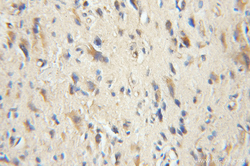Antibody data
- Antibody Data
- Antigen structure
- References [11]
- Comments [0]
- Validations
- Western blot [1]
- Immunohistochemistry [1]
Submit
Validation data
Reference
Comment
Report error
- Product number
- 11705-1-AP - Provider product page

- Provider
- Proteintech Group
- Proper citation
- Proteintech Cat#11705-1-AP, RRID:AB_2077302
- Product name
- CDK9 antibody
- Antibody type
- Polyclonal
- Description
- CDK9 antibody (Cat. #11705-1-AP) is a rabbit polyclonal antibody that shows reactivity with human and has been validated for the following applications: FC, IF, IHC, WB,ELISA.
- Reactivity
- Human
- Host
- Rabbit
- Conjugate
- Unconjugated
- Isotype
- IgG
- Vial size
- 20ul, 150ul
Submitted references Integrating cryo-OrbiSIMS with computational modelling and metadynamics simulations enhances RNA structure prediction at atomic resolution.
Inherited blood cancer predisposition through altered transcription elongation.
Sevoflurane-induced P300 promotes neuron apoptosis via Sp1/CDK9 pathway.
DNA framework-engineered chimeras platform enables selectively targeted protein degradation.
Antinuclear antibodies in individuals with COVID-19 reflect underlying disease: Identification of new autoantibodies in systemic sclerosis (CDK9) and malignancy (RNF20, RCC1, TRIP13).
Deficiency of WTAP in hepatocytes induces lipoatrophy and non-alcoholic steatohepatitis (NASH).
CSN6 promotes melanoma proliferation and metastasis by controlling the UBR5-mediated ubiquitination and degradation of CDK9.
The methyltransferase METTL3 negatively regulates nonalcoholic steatohepatitis (NASH) progression.
A Simplified Thermal Proteome Profiling Approach to Screen Protein Targets of a Ligand.
Menin enhances c-Myc-mediated transcription to promote cancer progression.
Synthesis, structure-activity relationship studies and biological evaluation of novel 2,5-disubstituted indole derivatives as anticancer agents.
Ward S, Childs A, Staley C, Waugh C, Watts JA, Kotowska AM, Bhosale R, Borkar AN
Nature communications 2024 May 22;15(1):4367
Nature communications 2024 May 22;15(1):4367
Inherited blood cancer predisposition through altered transcription elongation.
Zhao J, Cato LD, Arora UP, Bao EL, Bryant SC, Williams N, Jia Y, Goldman SR, Nangalia J, Erb MA, Vos SM, Armstrong SA, Sankaran VG
Cell 2024 Feb 1;187(3):642-658.e19
Cell 2024 Feb 1;187(3):642-658.e19
Sevoflurane-induced P300 promotes neuron apoptosis via Sp1/CDK9 pathway.
Zhou X, Liu C, Xia D
Clinical and experimental pharmacology & physiology 2023 Jul;50(7):541-553
Clinical and experimental pharmacology & physiology 2023 Jul;50(7):541-553
DNA framework-engineered chimeras platform enables selectively targeted protein degradation.
Zhou L, Yu B, Gao M, Chen R, Li Z, Gu Y, Bian J, Ma Y
Nature communications 2023 Jul 27;14(1):4510
Nature communications 2023 Jul 27;14(1):4510
Antinuclear antibodies in individuals with COVID-19 reflect underlying disease: Identification of new autoantibodies in systemic sclerosis (CDK9) and malignancy (RNF20, RCC1, TRIP13).
Bossuyt X, Vulsteke JB, Van Elslande J, Boon L, Wuyts G, Willebrords S, Frans G, Geukens N, Carpentier S, Tejpar S, Wildiers H, Blockmans D, De Langhe E, Vermeersch P, Derua R
Autoimmunity reviews 2023 Apr;22(4):103288
Autoimmunity reviews 2023 Apr;22(4):103288
Deficiency of WTAP in hepatocytes induces lipoatrophy and non-alcoholic steatohepatitis (NASH).
Li X, Ding K, Li X, Yuan B, Wang Y, Yao Z, Wang S, Huang H, Xu B, Xie L, Deng T, Chen XW, Chen Z
Nature communications 2022 Aug 4;13(1):4549
Nature communications 2022 Aug 4;13(1):4549
CSN6 promotes melanoma proliferation and metastasis by controlling the UBR5-mediated ubiquitination and degradation of CDK9.
Zhang Y, Hou J, Shi S, Du J, Liu Y, Huang P, Li Q, Liu L, Hu H, Ji Y, Guo L, Shi Y, Liu Y, Cui H
Cell death & disease 2021 Jan 22;12(1):118
Cell death & disease 2021 Jan 22;12(1):118
The methyltransferase METTL3 negatively regulates nonalcoholic steatohepatitis (NASH) progression.
Li X, Yuan B, Lu M, Wang Y, Ding N, Liu C, Gao M, Yao Z, Zhang S, Zhao Y, Xie L, Chen Z
Nature communications 2021 Dec 10;12(1):7213
Nature communications 2021 Dec 10;12(1):7213
A Simplified Thermal Proteome Profiling Approach to Screen Protein Targets of a Ligand.
Zhang X, Ruan C, Zhu H, Li K, Zhang W, Wang K, Hu L, Ye M
Proteomics 2020 Aug;20(15-16):e1900372
Proteomics 2020 Aug;20(15-16):e1900372
Menin enhances c-Myc-mediated transcription to promote cancer progression.
Wu G, Yuan M, Shen S, Ma X, Fang J, Zhu L, Sun L, Liu Z, He X, Huang D, Li T, Li C, Wu J, Hu X, Li Z, Song L, Qu K, Zhang H, Gao P
Nature communications 2017 May 5;8:15278
Nature communications 2017 May 5;8:15278
Synthesis, structure-activity relationship studies and biological evaluation of novel 2,5-disubstituted indole derivatives as anticancer agents.
Hu H, Wu J, Ao M, Wang H, Zhou T, Xue Y, Qiu Y, Fang M, Wu Z
Chemical biology & drug design 2016 Nov;88(5):766-778
Chemical biology & drug design 2016 Nov;88(5):766-778
No comments: Submit comment
Supportive validation
- Submitted by
- Proteintech Group (provider)
- Main image

- Experimental details
- A431 cells were subjected to SDS PAGE followed by western blot with 11705-1-AP(CDK9 antibody) at dilution of 1:1000
- Sample type
- cell line
Supportive validation
- Submitted by
- Proteintech Group (provider)
- Main image

- Experimental details
- The CDK9 antibody from Proteintech is a rabbit polyclonal antibody to a recombinant protein of human CDK9. This antibody recognizes human,mouse,rat antigen. The CDK9 antibody has been validated for the following applications: ELISA, WB, IHC analysis.
 Explore
Explore Validate
Validate Learn
Learn Western blot
Western blot ELISA
ELISA